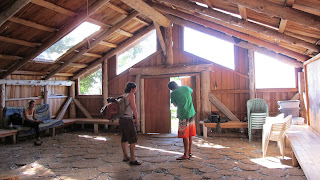Britt and Curt kayaking.
In the evening our group sat around the camp fire, admired the magnificent night sky, and resumed our discussion with Stehphen and Karen. A topic to which the conversation often returned is the meaning of economic development. The promise of economic development is often presented by government and industry as a silver bullet for solving the many social problems confronting First Nations people. Economic development brings jobs and money to these communities. It is in the name of economic development that logging, commercial fishing and aquaculture are introduced to this region. Given the extent of the social problems on some reservations, the development of these industries is generally seen as the only way to move forward.
Stephen called this approach into question. His main argument against economic development was not the impact it can have on the environment, although this was perhaps implicit in the discussion. Instead he saw economic development as adding fuel to the fire, supplying young people with sudden wealth, and providing the means to self destruction.
I put it to Stephen that economic development provides First Nations people with more than just cash, it also provides an occupation. It provides a sense of purpose. My long standing assumption has been that unemployment and the absence of opportunity is a primary reason why people, both on reservations and more generally, sometimes resort to drugs, alcohol, or even suicide. Stephen argued that there is another way of looking at this picture. What needs to be in place prior to economic development is a reconnection with traditional values. He does not see economic development as inherently bad. The problem is that it alone is an inadequate solution. One of the projects that Karen and Stephen undertake at Hooksum is an attempt to instil the necessary values in First Nations youth, to prepare them for the future. Stephen mentioned that many late nights were spent among the elders of his community, discussing what those lessons should be.
The conversation moved quickly and I am unable to recall all of the details. But one of the lessons that remains with me concerns the idea of how to treat people when doing business. In Western society we have a saying, "It's just business". This saying is used to justify all sorts of behaviours that are offensive and sometimes harmful. It is as if there were two distinct categories of human relation: business and civility. One of the lessons that Stephen and Karen emphasize is that this distinction is artificial. "We need a better way of doing business, of treating each other with respect".
Views from inside the long house building where our group stayed the night.
In designing this field course I felt it important to provide students with an exposure to First Nations' perspectives on environmental and social issues. Failing to do so would have neglected a very important dimension of the course. But one cannot simply approach one of these communities demanding answers to sensitive questions about how its members view themselves in the modern world. Without the generosity of Karen and Stephen, who invited us into their home and shared with us their insights, we would have missed out on a perspective that has enriched our lives. We are extremely grateful for their candor, their warmth and their generosity. I only hope that this humble blog reflects a fraction of what we took away from the experience, and does no injustice to the insights that were shared.





No comments:
Post a Comment